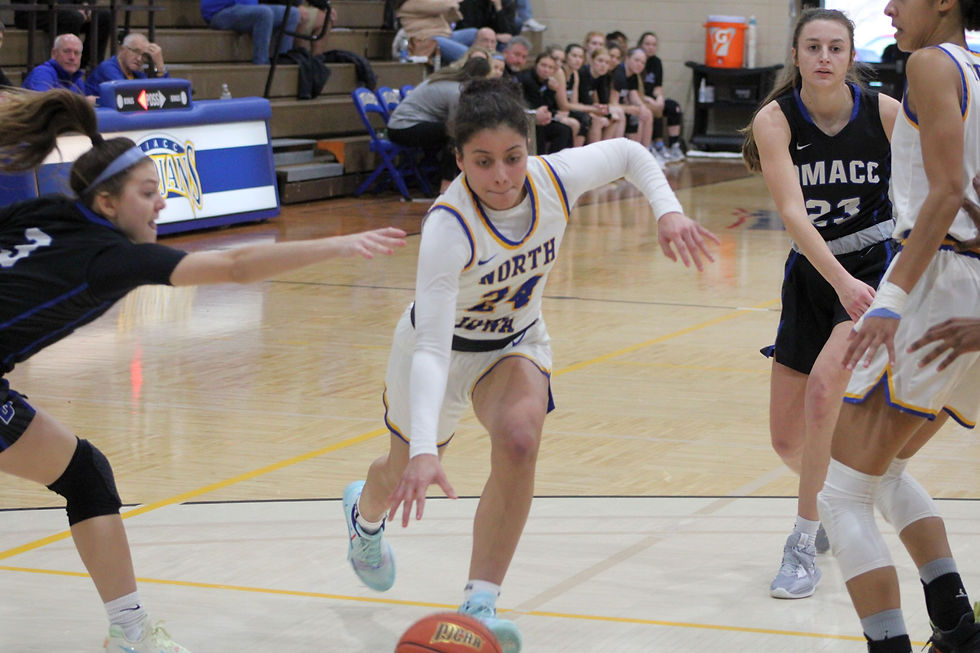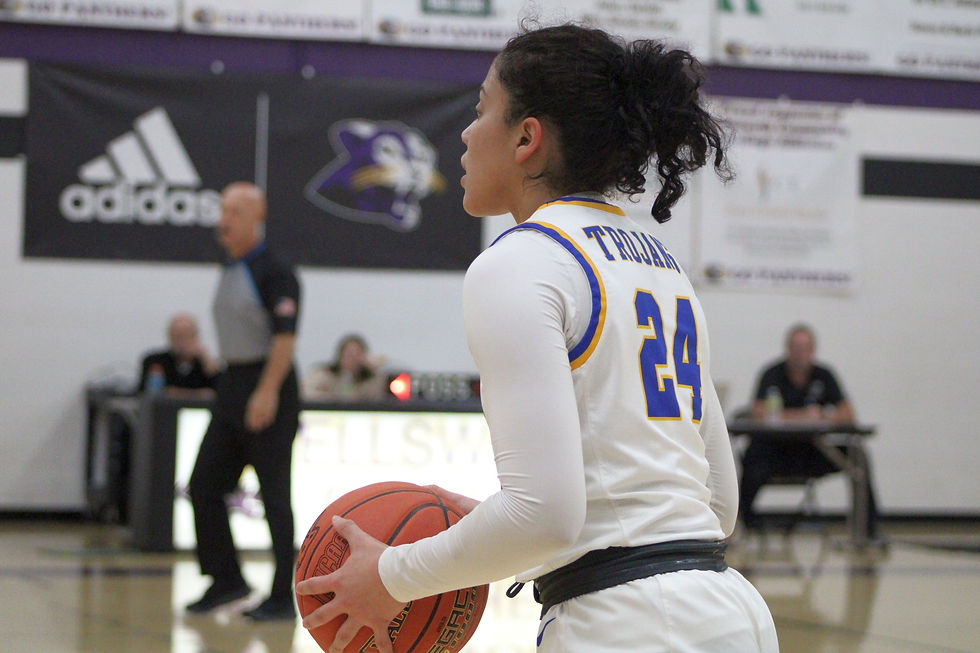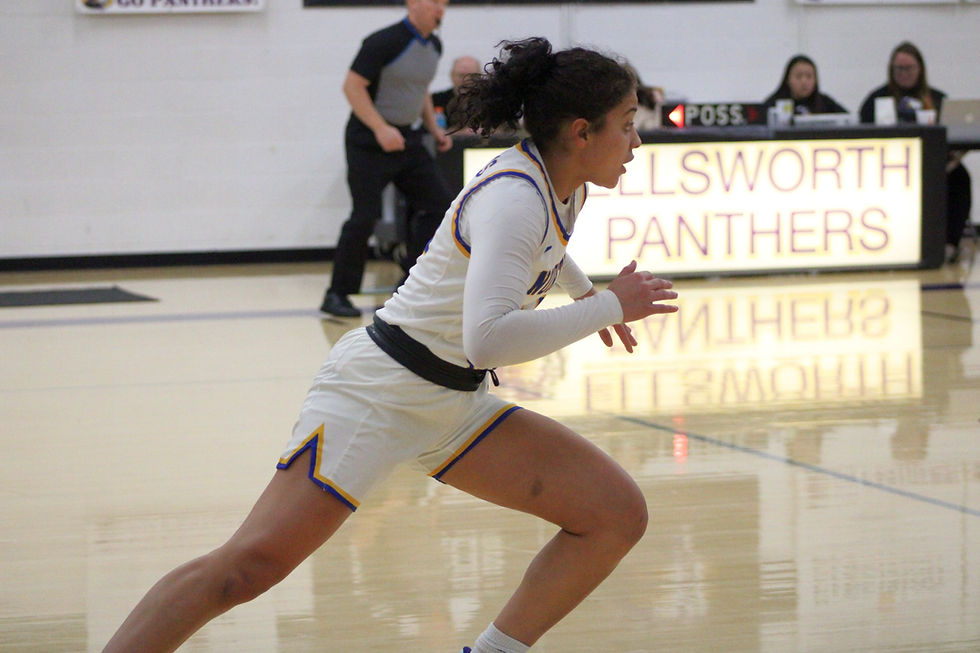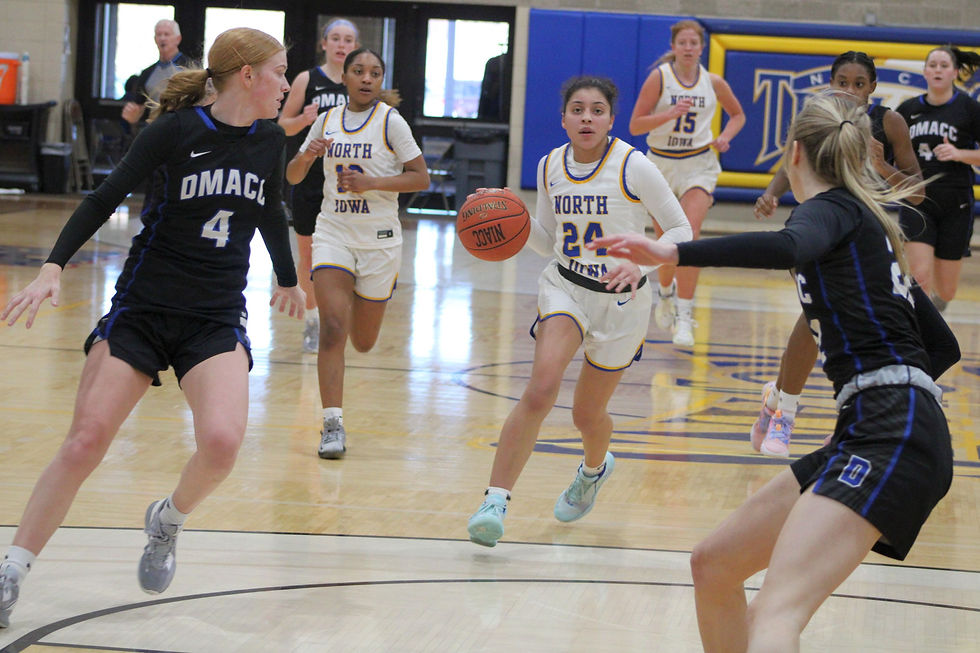NIACC's Audrey Martinez-Stewart is a Reflection of her Greatest Fan
- Matthew Cooper

- Dec 20, 2022
- 10 min read
Updated: Dec 21, 2022

"Don't ever cry."
As Audrey Martinez-Stewart saved a loose ball during an AAU tournament in Indiana, crying did not cross her mind.
She tried to go coast to coast, but before getting a shot up, her defender shoved her in the back. Audrey flew into a brick wall.
Crash.
As play continued on the opposite end of the court, Audrey slowly got back up and trotted back on defense. That's when the tears started, then stopped.
"I remember seeing him when I got up, and I immediately stopped crying because I'm like, what am I crying for? Even though it was a lot of pain," Audrey said.
"Him" meant "Dad."
The pain was intense. Yet Audrey knew that her dad was adamant about not showing weakness in the game. "People see weakness once you start crying," Audrey said. "That's why I don't cry."
Early Promise
Audrey began playing basketball in the fourth grade when her uncle Christhyan put her and her older sister Alexis into a recreational basketball league. Uncle Christian thought Alexis would be the all-star player, but only Audrey continued in the sport two years later.
That's when her dad stepped in to become her trainer. Leonard Stewart, a former Division I player with the University of Detroit-Mercy, seemed to be the perfect mentor. He played D1 and that’s what she wanted too.
When Audrey started playing, she noticed a couple things: her teammates were all taller and they did not pass her the ball.
"I would complain to my dad about it because I really wasn't good. And he said, if you want the ball, you got to go rebound it. So, he emphasized getting rebounds and steals and stopping the person, and then people will realize that you are effective and that you should get the ball."
Although Audrey still couldn't shoot to save her life, she learned from Dad that defense wins games, and made it her goal to be the best defender on the floor.
"I always had a big heart on defense," Audrey said.
Standing on the short end of five feet tall in junior high, she played small forward, due to Dad’s insistence, to increase her versatility on the court. In that position, she quickly learned that she could out-rebound girls much taller than herself by having sheer heart and will.
"My dad made me realize just because you're taller doesn't mean you're better than me," Stewart said. "You can't outdo me."

A Step Forward, and a Step Back
Audrey became a defensive stalwart with St. Paul Basketball, her winter AAU team, and at her local Highland Middle School in St. Paul, Minnesota. But as high school steadily approached, it was time for her to make a choice.
Attending public school all her life, Audrey always assumed that would be where she'd end up. However, some parents from her AAU team persuaded Audrey's parents to attend the private Cretin-Derham Hall High School. This would set her up for success, they argued, and give her a chance to play in college and receive an excellent education.
Initially, Audrey’s parents were hesitant to send their daughter to the school due to the financial challenges, but they ultimately decided to visit. Her parents changed their minds after meeting with the staff at the school — they particularly liked the rigor of its academics. Audrey enrolled in Cretin-Derham Hall.
Audrey wanted to make the most of her new-found opportunity, but she found the student body challenging. She faced vulgar remarks from students. She had to go to the school counselor to cope with the bullying. Nothing changed for two years.
Depression set in. Her love for basketball dwindled. She began to slump. Audrey knew her goal was to play D1 college ball, but she was not moving the needle in that direction.
She turned the ball over regularly in games and dragged her feet in practice.
Dad took note of her play and began to scrutinize it, often in harsh terms.
Audrey was not interested in hearing Dad’s brutal honesty.
"I remember just hearing my dad talk to me about how he expects more out of me and thinks my game is lacking and wants me to do better, and I'm thinking, I'm doing the best I can. What do you want me to do?”
Tough Love
Finally, in Audrey's junior year and frustrated with her development as a player, her father contemplated pulling her out of Cretin-Derham Hall.
"I didn't see them developing her handle," Leonard said.
"His being negative took the biggest toll on me and made me think, am I really worth it? Am I really good at basketball? Am I really worth the money they're spending on me?" recalled Audrey.
Audrey and her dad had an honest dialogue. Audrey told her father he was not lifting her up as an athlete and that he criticized her for her play on the court.
Dad felt otherwise.
"When you get out into real life, there's going to be a lot of people saying harsh things about you and pointing out your flaws," Leonard recalled telling Audrey. "You got to understand that life is tough."
He told Audrey that growing up, he did not have anyone to criticize him gently, so he was used to that tone. He became aware that his daughter was depressed then and apologized for being so direct and not softening his tone so she could understand where he was coming from.
"Everything we talked about in the conversation, I put it in the perspective of where I was at at the time and realized I was being a little sensitive," Audrey said. "I told him that he was completely fine and that I needed to toughen up. I was just broken down and wasn't trying to hear anybody say anything. We just talked about how we could build our relationship and how he wishes I would've listened to him more."
The talk was a wake-up call. Audrey was still deep in her basketball slump, but she now knew that her dad was in her corner.
"I can take negative criticism. But it just means more when it comes from my dad," Audrey said. "I feel it is more out of disappointment, and I do not want him to be disappointed in me because he means so much to me in my life because he is my dad.”

Turning Frustration into Success
Due to his commitments at work, Leonard could not directly assist with Audrey’s basketball skills, so she turned to another uncle, her uncle Kevin, for help over the summer.
Day in and day out, Audrey worked on her body, training through the flies and elements that summers in Minnesota brings. Weight training made Audrey feel more positive about her body and helped her feel better about her overall self. She pushed herself to keep up her at-home regimen.
“[Uncle Kevin] is the reason why I got out of my slump. So, I give him 1000% credit, and he does not like taking credit," Audrey said.
None other than her dad would give her kudos.
"She had to develop on her own, which is good," Leonard said. "That's the funny part about it: [coaches] can help you develop, but it takes you to develop."
Audrey improved from her junior year numbers in each statistical category in her senior season. As a result, she gained attention from the head coach at North Iowa Area Community College, Brad Vought.
Audrey then visited the school with her mother. Intrigued by the small school, she committed to NIACC.
"I supported her big time on that. The coach was just really excited to get her. I understood why she wanted to go, but I wanted to see how much [Audrey wanted] it," Leonard said. "That's what I used to tell her in basketball, and she showed me, and that's what she's been doing."
To the Next Stage
The summer entering her first year of college, Audrey was devastated when Uncle Christhyan passed away.
"Every year, he bought me a different pair of shoes for me to play basketball so my parents wouldn't have to worry," Audrey said. "Especially since they couldn't afford it sometimes, he was there to pay for it."
Audrey's uncle was also the reason she participated in AAU basketball, paying her fees for travel and other related expenses during the season. The uncle who introduced her to the sport would be unable to attend her collegiate games.
She was no longer playing for herself but for Uncle Christhyan. And she needed all the motivation she could generate in herself.
Standing at only five foot three, Audrey knew her life-long focus on defense and the stronger (and taller) competition at the JUCO level would pose significant challenges. She knew she would have to develop her game tremendously to be on the radar of Division I schools. So she went to work over that summer, creating a strong basketball foundation with her skills coach and founder of HoopTherapy LLC, Coach Lee.
"Audrey's one of those players that's easy to work with, I just help her with the skills and the knowledge," Coach Lee said. "It's hard to train a kid when you have to try to get them on a level of working hard, Audrey had that coming in."
She could not wait to play her first collegiate game and show the work she had put in all summer, but her body had other plans. Before the start of the season, Audrey went for a checkup at a clinic, where doctors discovered a blood clot in her chest.
"From the blood clot, they realized I had palpitations in my heart, which meant my heart was beating too fast, so I was not allowed to play basketball for a month," Audrey said.
"When I came back, I was behind on everybody else because I was not allowed to run, I was not allowed to work out, I was not allowed to do anything to make my heart beat a little too fast."
During a later checkup, doctors no longer found the clot in her chest. But the heart palpitations remained because her supplemental weight-lifting workouts made her heartbeat faster than normal. Instead of helping her energy and endurance as designed, Audrey’s training stopped her from playing at the beginning of her freshman year.
Audrey was finally cleared to play, and her self-discipline, combined with help from Coach Lee, would get her back into playing shape.
"She looks at adversity in the eye and is ready to fight," Coach Lee said.

College Success
Audrey and Coach Lee focused on the next step of her basketball development: offense.
Audrey would train with Coach Lee in the mornings before practice and games to make up for lost time. Then, she would play one-on-one with her teammates and, for added difficulty, would go up against Coach Lee for the ultimate test.
"She didn't have certain skills to be able to be effective offensively at the level we needed her to be on," Coach Lee said. "She really had to work at that stuff, her shooting, going left, as that went on, she was also playing a lot of minutes for us, so she's guarding the best player 40 minutes as well as carrying the offensive load."
When Audrey returned to the team, she was the spark they needed, and her presence was felt.
“One hundred percent if you got a good game with Audrey, everybody else around her looks better," Audrey's freshman year roommate and teammate Jasmine Jackson said.
Still, the first time Audrey and her team played Kirkwood Community College, the number one JUCO team in the nation, they got embarrassed, losing by 40 points. They had to return to the drawing board.
Audrey observed they needed to press the ball more and play at a faster pace. She let that be known among her teammates and coaches that they had to pivot to produce better results as a team.
"Audrey has earned the right to lead because she is such a good player, student, and person," Coach Vaught said. "So, she has put herself in that spot.”
Later in the season, NIACC would get another shot at Kirkwood. This time, they had a more fast-paced approach and full-court pressed for 40 minutes.
The Trojans still lost, but by a mere nine points. Their progress showed they could compete at a high level.
Audrey and her team got another chance to beat a top-ten opponent facing Iowa Western Community College. As the game headed down to the wire with NIACC up by two points. Audrey received the ball on the fast break, sealing the game with a layup, finishing 59-54.
"When we beat them, I don't know if we took Audrey off the floor," Coach Vaught said. "I think she played every second of that game."
Audrey received ICCAC Division II Women's Basketball Player of the Week following the win.
By the end of the season, NIACC finished 22-9, completing the largest turnaround in their program's history after just winning four games the previous season. Audrey was the Swiss Army Knife for NIACC, averaging 11.3 points per game, 5.6 rebounds, 4.2 assists, and 3.1 steals on the season. Her performance earned her All-NJCAA Region XI third-team honors for the 2021-2022 season.

Did Dad Know Best?
Audrey exemplifies mental toughness. As she recognized, “Coming to a college program being looked at as a defender and then putting in the work as our leading scorer is adversity because there are a lot of mental hurdles you have to overcome.”
Her coaches see this as an asset. As Coach Vaught stated, “She is really smart. She takes time to teach players, especially the newer players, what we're trying to do. She lets everybody know when she feels like we could be doing better. Then, I sit back and let her go, which is excellent stuff.”
Coach Vaught’s compliment to Audrey also describes another member of the Stewart family. Her dad too, let Audrey know where she could improve — and after the two found the right balance, these lessons helped Audrey shine.
When her father sees her play at NIACC, he is proud of her game.
"I love her defense, her instinct of knowing where to be is really good. And I like watching that develop," Leonard said. "These are things you can take into your normal everyday life, work hard, be positive, be a team player, understand and develop those things."
With all that Audrey has accomplished, her story is still ongoing. She intends to make an even bigger splash after her second season at JUCO, hoping to play Division I basketball like her father.
According to Coach Vaught, "She's getting D1 looks . . .And she will be named Academic All Region again in a few weeks. Amazing player, student, and person."
Dad agrees. "I'm very proud of that girl because she's doing it on her own. And that's what I want to see. I don't want to see me holding your hand because it's no guarantee I'll be there. You want to see a leader on the court and a leader in life."
Audrey knows firsthand that perseverance under challenging situations is the key to winning. With her dad by her side, no feat is too big for Audrey on her road to success.
If you enjoyed this article, please consider making a tax deductible donation. College Basketball Times is a 501 (c)(3) non-profit organization dedicated to equal coverage for women and all levels of college hoops - including JUCO. The operation of this site is made possible through your generous donations.
(Tax Deductible)




Comments